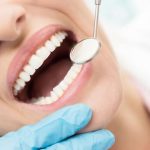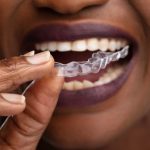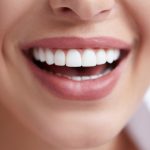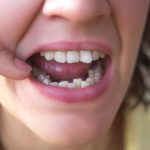Prevent Teeth Shifting: Natural Ways to Keep Teeth Straight Without a Retainer
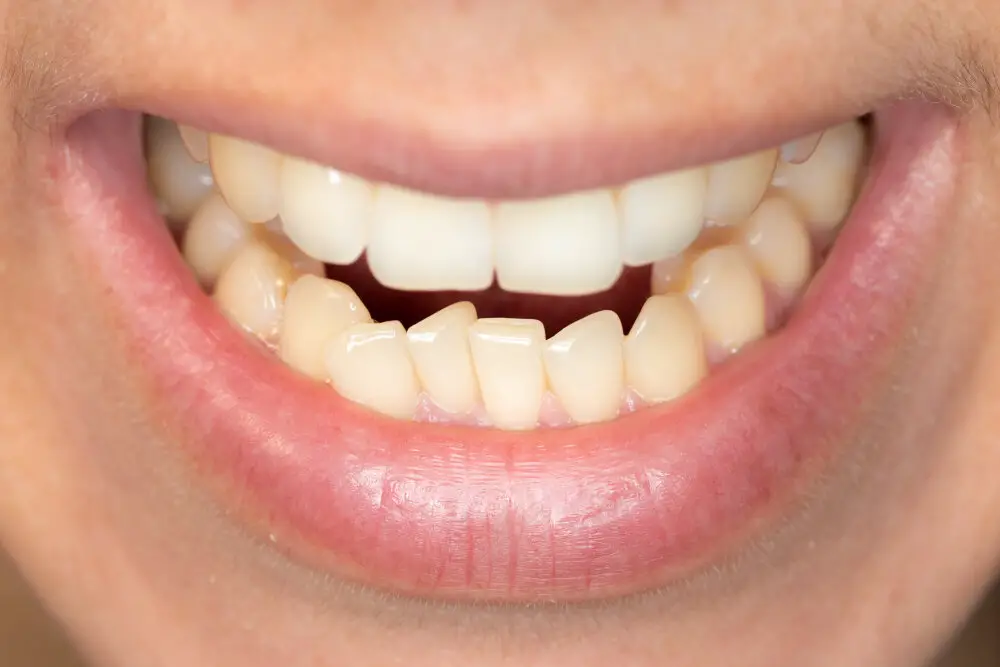
A beautiful smile is something that everyone desires, and straight teeth are a crucial part of it. However, after orthodontic treatment, the teeth tend to shift back to their original position if proper care is not taken. Wearing a retainer is the most common solution for preventing teeth shifting, but it can be uncomfortable and inconvenient. Luckily, there are natural ways to keep teeth straight without a retainer, and in this article, we will discuss some of the best practices. Maintaining good oral hygiene is essential to keep teeth straight and healthy. Brushing twice a day, flossing, and using mouthwash can help prevent plaque buildup, which can lead to tooth decay and gum disease. Moreover, keeping teeth clean can also reduce the chances of teeth shifting due to the pressure caused by the accumulation of bacteria and food particles. Therefore, regular dental checkups are essential to ensure that the teeth and gums are healthy, and any underlying issues are addressed before they cause further damage.
Preventing teeth from shifting is crucial to maintain a healthy and beautiful smile. Teeth shifting can lead to several dental issues like overcrowding, bite problems, and gum disease. Overcrowding can cause difficulty in cleaning the teeth, leading to the accumulation of bacteria and plaque, which can lead to gum disease and tooth decay. Bite problems can result in jaw pain, headaches, and even tooth loss. Ensuring that teeth stay in their correct position can also help maintain facial structure and prevent premature aging. Therefore, it is imperative to take natural measures to prevent teeth from shifting and maintain good oral health.
While retainers have long been known as a go-to solution for maintaining straight teeth, they are not the only option available. There are several natural ways to keep teeth straight without a retainer. One of the most effective methods is to practice good oral hygiene, which involves brushing twice a day, flossing regularly, and using mouthwash to keep bacteria at bay. Another way is to maintain a healthy diet that is rich in calcium and vitamin D, which are essential for strong teeth and bones. Additionally, avoiding bad habits like nail-biting and chewing on pencils can help prevent teeth from shifting. By incorporating these natural practices into your daily routine, you can maintain your beautiful smile for years to come.
Maintain Good Oral Hygiene
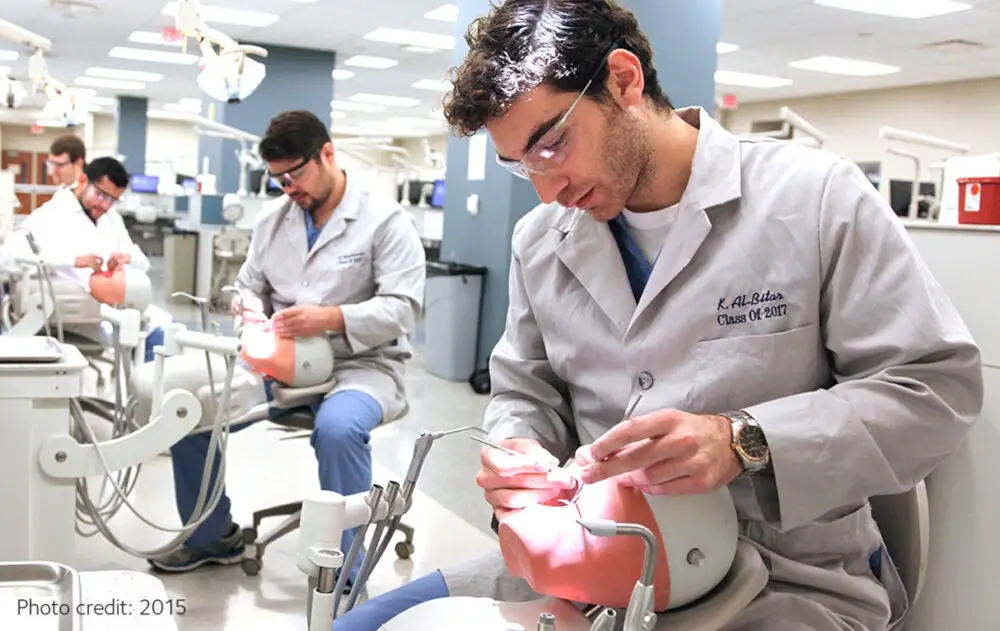
Maintaining good oral hygiene is crucial to prevent teeth from shifting. Brushing your teeth twice a day and flossing daily can help keep your teeth clean and healthy. This will prevent the buildup of plaque and bacteria, which can lead to tooth decay and gum disease. When teeth are healthy, they are less likely to shift out of place. Additionally, using mouthwash can help kill any remaining bacteria in your mouth and leave your breath fresh. By keeping your teeth clean and healthy, you can help prevent them from shifting and maintain a straight smile. In addition to brushing, flossing, and using mouthwash, there are other things you can do to maintain good oral hygiene. Eating a healthy diet that is low in sugar and acidic foods can help prevent tooth decay. Drinking plenty of water can also help keep your mouth clean and hydrated. Furthermore, it is important to visit your dentist regularly for checkups and cleanings. Your dentist can identify any potential issues early on and provide treatment to prevent teeth from shifting. By incorporating these habits into your daily routine, you can maintain good oral hygiene and keep your teeth straight without the need for a retainer.
Brushing and flossing are essential oral hygiene practices that play a crucial role in preventing gum disease and tooth loss. Gum disease is caused by the buildup of plaque and tartar on your teeth, which can lead to inflammation and infection of your gums. Regular brushing and flossing help to remove plaque and prevent it from hardening into tartar. This, in turn, reduces the risk of gum disease and tooth loss. Additionally, regular brushing and flossing can help to remove food particles and bacteria from your mouth, which can also contribute to gum disease and tooth decay. By maintaining good oral hygiene habits, you can prevent gum disease and tooth loss and keep your teeth healthy and strong for years to come.
Missing teeth can cause the remaining teeth to shift because the teeth on either side of the gap are no longer anchored in place. As a result, they will begin to move towards the empty space. This movement can cause a chain reaction, leading to overcrowding, misalignment, and even jaw problems. Additionally, missing teeth can cause changes to the bite, which can lead to further complications such as difficulty chewing, speech problems, and uneven wearing of teeth. Therefore, it is essential to replace missing teeth to prevent the remaining teeth from shifting and maintain proper oral health.
Maintaining good oral hygiene is crucial not only for the health of your teeth but also for the overall well-being of your body. To maintain good oral hygiene, it is important to brush your teeth at least twice a day using fluoride toothpaste, floss daily, and use mouthwash to kill bacteria and freshen breath. Additionally, it is important to limit sugary and acidic foods and drinks, which can erode the enamel on your teeth and lead to decay. Visiting your dentist regularly for cleanings and check-ups can also help prevent any potential issues from developing. By following these simple tips, you can ensure that your teeth stay healthy and your smile remains bright.
Eat a Healthy Diet
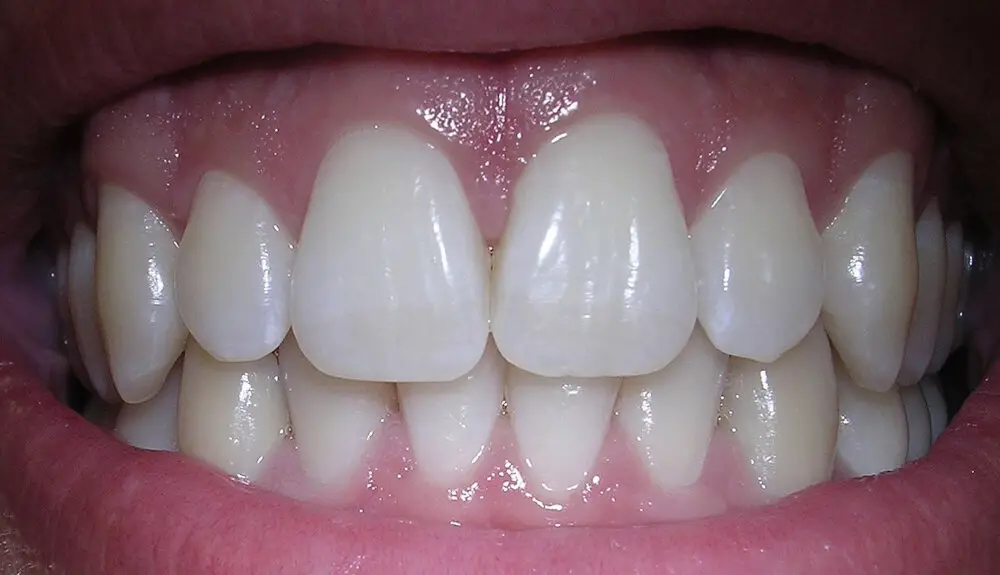
Eating a healthy diet is crucial in preventing teeth shifting. A balanced diet rich in essential vitamins and minerals strengthens the teeth and gums, keeping them healthy and preventing them from moving out of place. Foods that are high in calcium, such as milk, cheese, and leafy greens, are especially beneficial for maintaining strong teeth. Vitamin D is also important for healthy teeth as it helps the body absorb calcium. Foods that are high in vitamin D include fatty fish, egg yolks, and fortified cereals. Eating a diet that is rich in fruits and vegetables can also contribute to healthy teeth and gums, as they provide antioxidants that help protect against gum disease. On the other hand, consuming sugary and acidic foods and drinks can lead to tooth decay and weaken the enamel, making teeth more susceptible to shifting. Sugary drinks such as soda and juice should be limited, and if consumed, should be followed by rinsing the mouth with water to help neutralize the acids. Sticky and chewy foods should also be avoided, as they can get stuck in between teeth and cause decay. By making healthy food choices and limiting harmful foods and drinks, individuals can maintain a healthy diet that not only benefits overall health but also keeps teeth straight and healthy.
A diet that is high in sugar and carbohydrates can lead to tooth decay because the bacteria in the mouth feed on these sugars and carbohydrates, producing acid as a byproduct. The acid then erodes the tooth enamel, which is the protective layer of the teeth. Over time, this erosion can lead to cavities, which can cause pain, sensitivity and even tooth loss. Additionally, a diet high in sugar and carbohydrates can increase inflammation in the body, which can exacerbate gum disease and lead to tooth loss. To prevent tooth decay, it is important to limit sugary and carbohydrate-rich foods and drinks and to maintain good oral hygiene habits, such as brushing and flossing regularly.
Calcium and vitamin D are essential for strong teeth because they play a crucial role in the development and maintenance of healthy teeth and bones. Calcium is the primary mineral found in teeth, and it helps to keep them strong and resistant to decay. Vitamin D is necessary for the absorption of calcium in the body and helps to regulate the levels of calcium and phosphorus in the blood. Without enough calcium and vitamin D, teeth can become weaker and more susceptible to damage, including shifting and crowding. Therefore, it is important to have a balanced diet that includes foods rich in calcium and vitamin D, such as milk, cheese, yogurt, fatty fish, and leafy greens, to ensure strong and healthy teeth.
Maintaining a healthy diet is crucial for overall health, including oral health. To prevent teeth shifting, it is important to consume a balanced diet rich in vitamins and minerals, such as calcium, vitamin D, and phosphorus. These nutrients help to strengthen teeth and bones, keeping them healthy and in place. Avoiding sugary and acidic foods and drinks is also important, as they can erode tooth enamel and contribute to tooth decay and gum disease. Additionally, drinking plenty of water can help to wash away food particles and bacteria that can lead to dental problems. Incorporating a variety of fruits, vegetables, lean proteins, and whole grains into your diet can provide the nutrients necessary for maintaining a healthy smile.
Practice Good Posture

Good posture is not only important for preventing back pain, but it can also have a positive impact on your dental health. When you slouch or hunch over, your jaw can shift forward, putting pressure on your teeth and causing them to shift. By practicing good posture, you can keep your jaw in a more relaxed position and reduce the risk of teeth shifting. So, sit up straight, keep your shoulders back, and make sure your feet are planted firmly on the ground. Not only will this help prevent teeth shifting, but it will also improve your overall health and well-being. In addition to preventing teeth shifting, good posture can also improve your breathing and digestion. When you slouch, your diaphragm is compressed, making it difficult to breathe deeply and efficiently. This can lead to fatigue, anxiety, and other health problems. By maintaining good posture, you can expand your lungs and breathe more easily, reducing stress and improving your energy levels. Good posture also helps to keep your digestive system functioning properly by reducing pressure on your stomach and intestines, helping to prevent problems like acid reflux and constipation. So, make it a habit to sit up straight and maintain good posture throughout the day – your teeth, and your overall health, will thank you!
Poor posture can have a significant impact on the alignment of the jaw and teeth. When the head and neck are not in the correct position, it can cause strain on the muscles and joints in the jaw, leading to misalignment. This misalignment can then cause the teeth to shift, resulting in an incorrect bite and potential dental problems such as tooth decay, gum disease, and even headaches. Additionally, poor posture can cause tension in the neck and shoulders, which can exacerbate the problem and lead to further discomfort. Therefore, it is essential to maintain good posture to avoid any negative effects on the alignment of the jaw and teeth.
Maintaining good posture by sitting and standing up straight is crucial not only for a healthy spine but also for keeping teeth straight. When we slouch or hunch over, it can lead to a misaligned jaw and put pressure on our teeth, causing them to shift and become crooked. In addition, poor posture can result in a decrease in the amount of oxygen that reaches our muscles, including those in our face and jaw, which can cause tension and pain. By making a conscious effort to sit and stand up straight, we can not only improve our overall health but also preserve the straightness of our teeth without relying on a retainer.
Maintaining good posture is essential not only for a healthy spine but also for keeping your teeth in their proper alignment. Some tips for practicing good posture include sitting up straight with your shoulders back and down, keeping your feet flat on the ground, and avoiding crossing your legs. When standing, distribute your weight evenly on both feet and engage your core muscles to support your spine. It’s also important to take frequent breaks and stretch throughout the day to prevent muscle tension and stiffness. By practicing good posture, you can not only improve your dental health but also your overall well-being.
Exercise Your Jaw and Teeth
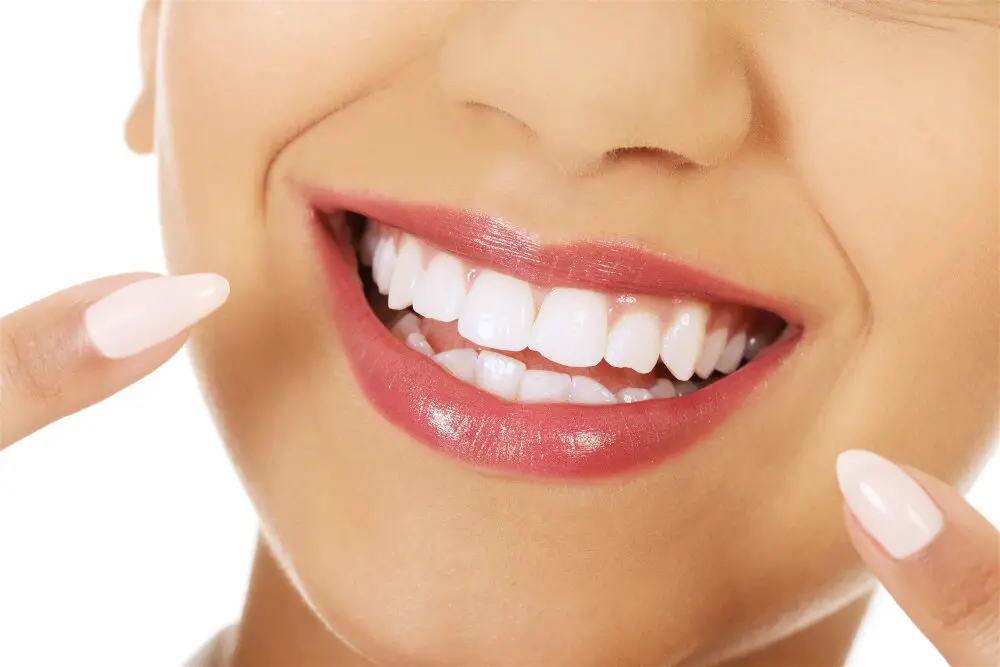
When it comes to maintaining straight teeth, one important factor that is often overlooked is the strength of the jaw muscles. Exercising your jaw and teeth can help prevent teeth shifting by promoting a strong and stable foundation for your teeth. One simple exercise is to practice chewing gum daily. Chewing gum not only strengthens the jaw muscles but also helps to produce saliva, which can aid in neutralizing harmful acids in the mouth. Another exercise is to hold a pencil between your teeth for a few minutes each day. This can help to strengthen the muscles on the sides of your face and improve the alignment of your teeth. In addition to exercising your jaw and teeth, it is also important to maintain good oral hygiene practices. Brushing and flossing regularly can help to prevent plaque buildup, which can lead to gum disease and tooth loss. It is also important to avoid habits that can weaken the teeth, such as grinding or clenching your teeth, biting on hard objects, and consuming sugary or acidic foods and drinks. By incorporating these natural methods into your daily routine, you can help to keep your teeth straight and healthy without the need for a retainer.
Exercising the jaw and teeth is an effective way to prevent shifting of teeth. Chewing hard foods such as carrots, apples, and nuts can strengthen the jaw muscles and create a firm foundation for the teeth to remain in place. Additionally, performing jaw exercises, such as opening and closing the mouth and moving the jaw side to side, can also improve jaw strength and stability. A strong jaw and teeth can help prevent teeth from shifting, especially after orthodontic treatment. Consistently incorporating these exercises into your daily routine can help keep your teeth straight and prevent any unwanted shifting.
Chewing gum and performing jaw exercises can provide several benefits in preventing teeth shifting and maintaining their straightness. Firstly, chewing gum promotes saliva production, which helps to neutralize harmful acids in the mouth and prevent tooth decay. Additionally, the act of chewing gum can help strengthen the jaw muscles, which can prevent the teeth from shifting due to a weak jawbone. Similarly, jaw exercises like clenching, stretching or resistance training can promote jaw strength and stability. Incorporating these activities into your daily routine can enhance your overall oral health and prevent the need for a retainer to correct any teeth shifting.
In order to exercise the jaw and teeth, there are several tips that can be followed. One way is to chew gum regularly, as this can help to strengthen the muscles in the jaw and reduce tension. Another effective exercise is clenching and unclenching the jaw, which can be done several times a day for a few minutes at a time. Additionally, practicing tongue exercises, such as pushing the tongue against the roof of the mouth or moving it from side to side, can help to improve overall oral health and stability. Finally, maintaining good posture and avoiding habits such as nail-biting or teeth-grinding can also help to prevent teeth shifting and promote healthy jaw and tooth development.
Retainers are essential to keep teeth straight after braces are removed. Nevertheless, there are natural ways to maintain straight teeth without a retainer. One of the most effective ways is to maintain good oral hygiene, including brushing and flossing regularly. Chewing sugarless gum can also help to strengthen the jaw muscles and prevent teeth from shifting. Another natural way to keep teeth straight is by avoiding habits such as biting nails, chewing on pens, or grinding teeth. Additionally, eating a balanced diet with adequate calcium and vitamin D can help maintain healthy teeth and bones, which can prevent teeth from shifting. Lastly, it’s recommended to visit the dentist regularly to ensure that teeth are healthy and straight. By following these natural ways, you can keep your teeth straight and healthy without having to rely on a retainer.
Maintaining good oral hygiene, eating a balanced diet, sitting upright, and exercising your jaw and teeth are crucial to keeping your teeth straight without a retainer. Brushing and flossing regularly will help keep your teeth clean and free of harmful bacteria that can cause decay and gum disease. Eating nutrient-rich foods like fruits, vegetables, and dairy products can help strengthen teeth and bones, while avoiding sugary snacks and drinks can prevent cavities. Additionally, sitting up straight and exercising your jaw muscles through chewing gum or practicing jaw exercises can promote proper alignment and prevent teeth from shifting. By adopting these simple yet effective habits, you can maintain a straight, healthy smile for years to come.
Conclusion

In conclusion, maintaining straight teeth without a retainer may seem like a daunting task, but there are several natural ways to prevent teeth shifting. By adopting healthy habits like maintaining good oral hygiene, eating a well-balanced diet, and avoiding bad habits like teeth grinding and nail biting, you can keep your teeth straight and healthy. Additionally, practicing good posture, using a mouthguard during sports, and regularly visiting your dentist can also help prevent teeth shifting. It’s important to remember that each person’s teeth are unique, so it’s always best to consult with a dental professional to determine the best course of action for your individual needs. By taking proactive steps to maintain your teeth, you can enjoy a healthy, straight smile for years to come.
